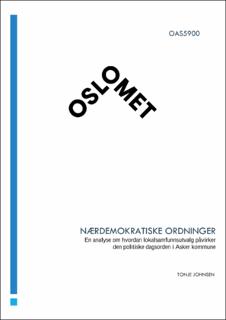Nærdemokratiske ordninger En analyse om hvordan lokalsamfunnsutvalg påvirker den politiske dagsorden i Asker kommune
Master thesis
Published version
Permanent lenke
https://hdl.handle.net/11250/3089027Utgivelsesdato
2023Metadata
Vis full innførselSamlinger
Sammendrag
Denne oppgaven vil belyse en nærdemokratisk ordning som finnes i Asker kommune. Tre lokalsamfunnsutvalg ble opprettet i 2020 for å løse utfordringer med kommunesammenslåingen av Asker, Hurum og Røyken. Målet er å forstå hvilke utfordringer som er knyttet til nærdemokratiske ordninger og se på hvilken innvirkning denne ordningen har hatt på den politiske dagsorden i Asker kommune siden opprettelsen.
Avhandlingen viser at lokalsamfunnsutvalgene har svært lite direkte innflytelse på hva som havner på den politiske dagsorden i Asker kommune. En gjennomgang over alle møteprotokoller over to år viser at de tre utvalgene har brukt svært mye tid på å behandle søknader fra lokale aktører. Det har brukt mest tid på å behandle og komme med innspill på kommunens temaplaner, handlingsplaner og kommuneplaner. I tillegg har de levert noen høringsinnspill.
Gjennom det teoretiske rammeverket med eksisterende forskning på innbyggermedvirkning og sakspolitikk på lokalt nivå samsvarer resultatene med andre studier som viser hva som har vært gjort og effektene slike ordninger har hatt. Det er vanskelig å nå igjennom til den politiske beslutningsmyndigheten for innbyggere selv om de er organisert som et politisk organ. This assignment will explain the local democratic arrangement that exists in Asker municipality. Three local community committees were established in 2020 to address challenges related to the merger of Asker, Hurum, and Røyken municipalities. The goal is to understand the challenges associated with local democratic arrangements and examine the impact that this arrangement has had on the political agenda in Asker municipality.
The thesis shows that the local community committees have very little direct influence on what ends up on the political agenda in Asker municipality. A review of all meeting protocols over two years shows that the three committees have spent a lot of time processing applications from local actors. They have spent the most time processing and providing input on the municipality's thematic plans, action plans, and municipal plans. In addition, they have submitted some consultation responses.
Through the theoretical framework of existing research on citizen participation and agenda-setting at the local level, the results correspond with what has been done in other research papers and the effects such arrangements have had. It is difficult for citizens to reach the political decision-making authority even if they are organized as a political body.
